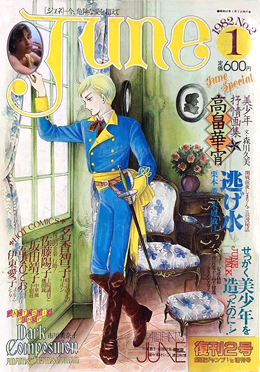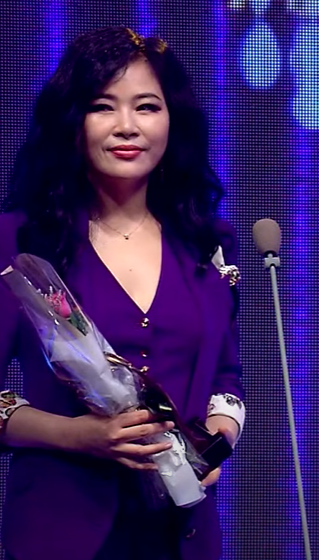Enka (演歌) is a Japanese music genre considered to resemble traditional Japanese music stylistically. Modern enka, however, is a relatively recent musical form, which adopts a more traditional musical style in its vocalism than ryūkōka music, popular during the prewar years.

Kwon Bo-ah, known professionally as BoA, is a South Korean singer, songwriter, dancer, producer and actress. She is often referred to as the "Queen of K-pop".
J-pop, natively also known simply as pops, is the name for a form of popular music that entered the musical mainstream of Japan in the 1990s. Modern J-pop has its roots in traditional music of Japan, and significantly in 1960s pop and rock music. J-pop replaced kayōkyoku, a term for Japanese popular music from the 1920s to the 1980s in the Japanese music scene.

Park Yong-ha was a South Korean actor and singer.
Trot is a genre of Korean popular music, known for its use of repetitive rhythm and vocal inflections. Originating during the Japanese occupation of Korea in the first half of the 20th century, trot was influenced by many genres of Korean, Japanese, American, and European music.
Ithamara Koorax is a Brazilian jazz and pop singer. For several years, she was voted one of the best jazz singers of the world by DownBeat Readers Polls. In 2008 and 2009, Koorax placed third on the "Female Vocalist" category on the 73rd DownBeat Readers Polls, with Diana Krall on the first place and Cassandra Wilson on second,, as well as on the 74th Annual Readers Poll.

First Love (Korean: 첫사랑) is a South Korean television series starring Lee Seung-yeon, Choi Soo-jong and Bae Yong-joon. It aired on KBS2 from September 7, 1996 to April 20, 1997 on Saturday and Sunday at 19:55 for 66 episodes.

Edward Haydn Higgins was an American jazz pianist, composer, and orchestrator. His performance and composition in 1959's "Cry of Jazz" is preserved in the Library of Congress' National Film Registry.

Chae-yeon Lee, best-known mononymously as Chae Yeon, is a Korean pop singer who rose to fame with her hit single "Two of Us" in 2004.
Keiko Takemiya is a Japanese manga artist, professor and university administrator. As part of the Year 24 Group, she was a leading figure in shōjo manga scene in the 1970s creating such manga as Kaze to Ki no Uta, Toward the Terra, Natsu e no Tobira. Additionally she became head of the Faculty of Manga at Kyoto Seika University, and then later became the president of the university.

Lee Min-ki is a South Korean actor, singer, and model. Lee's first leading role in television was in the 2005 sports drama Taereung National Village. He has gone on to star in many television series, including Love Truly (2006), Dal-ja's Spring (2007), Because This Is My First Life (2017), The Beauty Inside (2018), My Liberation Notes (2022) and Behind Your Touch (2023). Lee has also starred in feature films, most notably in the box office hits Tidal Wave (2009), Quick (2011), Spellbound (2011) and Very Ordinary Couple (2013).

Hotel on the Corner of Bitter and Sweet is a historical novel by Jamie Ford. The story is told in two parallel storylines, one following 12-year-old Henry Lee's experiences during the Second World War, and the other depicting Henry 44 years later as a widower with a college-aged son. The plot centers around the forced evacuation of Japanese Americans to internment camps; the book depicts the pain and trauma of separation through the friendship of the Chinese-American Henry and his Japanese-American friend Keiko.

June was a Japanese magazine focused on shōnen-ai, a genre of male-male romance fiction aimed at a female audience. It was the first commercially published shōnen-ai magazine, launching in October 1978 under the title Comic Jun and ceasing publication in November 1995. June primarily published manga and prose fiction, but also published articles on films and literature, as well as contributions from readers. The magazine spawned multiple spin-off publications, notably Shōsetsu June and Comic June.
Keiko Terada is a Japanese rock singer. She was co-founder and lead singer of the successful Japanese female hard rock and heavy metal band Show-Ya from 1982 to 1991, before going solo. On her solo albums she expanded from hard rock and heavy metal to blues, pop and soul.
Steffanie Reiko Borges, known under her stage name Steffanie is a Japanese-American singer, songwriter and musician.
Kyung-ja, also spelled Kyong-ja, Kyoung-ja or Gyeong-ja, is a Korean feminine given name. The meaning differs based on the hanja used to write each syllable of the name. There are 54 hanja with the reading "kyung" and 28 hanja with the reading "ja" on the South Korean government's official list of hanja which may be used in given names. Typically, "ja" is written with the hanja meaning "child" (子). The characters used to write this name can also be read as a Japanese female given name Keiko.
Hye-ja is a Korean feminine given name. Its meaning depends on the hanja used to write each syllable of the name.

Lee Hyun-woo, born Lee Sang-won, also known as Jessie Lee, is a Korean-American singer and actor.

Lee Hye-young is a South Korean actress, singer and businesswoman. As a singer in the 1990s, Lee released two dance music albums each with 1730 and Coco, and one album as a solo artist. When she switched to acting, Lee starred in television series such as Premonition (1997), Dal-ja's Spring (2007) and Queen of Housewives (2009), and also founded the fashion brand Miss Dorothy.

WoongSan is a South Korean musician. She has been a leading figure in the jazz music scene in Korea and Japan for over a decade, having performed live over 500 times since her 1998 Japanese debut. She is the first Korean-born musician to perform at New York City's historic Blue Note Jazz Club and has collaborated with many other well-known jazz musicians including Benny Green, Lonnie Plaxico, Rodney Green, Conrad Herwig and Suzuki Hisatsugu. She is also well known for training Ali, a popular K-pop singer.










